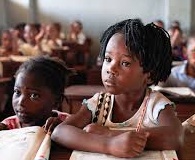《國際》版塊
Teaching in English around the world
在世界各地用英語教學
Language without instruction
沒有指導的語言
LAHORE AND LUCKNOW
拉合爾和勒克瑙
More children in Africa and South Asia are being taught in English. That’s often a bad thing
在非洲和南亞,越來越多的兒童正在接受英語教育。這通常是件壞事。
“Roly poly right, right, right. Roly poly left, left, left,” sings a class of five-year- olds at a government primary school on the outskirts of Lucknow, a city in India’s Hindi-speaking heartland. This English- medium school, one of seven that opened last year among the 215 government schools in the Sarojini Nagar administrative block, is part of an effort by the government of Uttar Pradesh, India’s most populous state, to counter the rise of private schools. Private schools have been mushrooming in India—private-sector enrolment rose from around a quarter of pupils in 2010-11 to over a third in 2016-17— and in Sarojini Nagar there are 200 registered private schools and many more unregistered ones. One of their main attractions is that the great majority of them use (or claim to use) English as the language of instruction.
“右,右,右。左,左,左,”印度講印地語的中心城市勒克瑙郊區的一所公立小學里,一群五歲的孩子正在唱歌。這所英語學校是去年薩羅吉尼納加爾行政街區215所公立學校中開辦的7所學校之一,北方邦是印度人口最多的州,為抗衡私立學校的的發展,北方邦政府建了這所學校。私立學校在印度如雨后春筍般涌現——私立學校的入學率從2010-11年的四分之一上升到2016-17年的三分之一以上——在薩羅吉尼納加爾有200所注冊私立學校和更多的未注冊學校。其主要吸引力之一是,絕大多數使用(或聲稱使用)英語作為教學語言。
As a recruitment drive, the policy seems to be working. A school nearby saw its enrolment rise over 50% in six months when it switched the medium of instruction from Hindi to English last April. As an education policy, however, it is not ideal.
隨著一股招聘浪潮,這項政策似乎有效。去年4月,附近一所學校將教學語言從印度語改為英語后,入學率在六個月內上升了50%。然而,這并非一項理想的教育政策。
The language in which children are taught can be hugely contentious. Colonial history determines its political salience. Where colonial powers wiped out the indigenous population, such as in America and Australia, it is hardly an issue: the colonial language has crushed indigenous ones, though a few of these are making a comeback. In places that were colonised unsuccessfully or not at all—such as Europe, Japan and China—indigenous languages rule. But controversy erupts in countries with a century or two of effective government by a colonial power—in South Asia and Africa, for instance—where the colonial language retains considerable sway.
孩子們使用的教學語言可能引起很大爭議。殖民歷史決定了其政治重要性。列強滅絕原住民的地方如美國和澳大利亞,幾乎沒有這類問題:盡管某些土著語言有卷土重來的趨勢,但早已被殖民語言摧毀。在殖民失敗或是從未被殖民過的地方——如歐洲、日本和中國——則一直使用本土語言。但經過一兩個世紀殖民統治的地方,如南亞、非洲,卻爆發了很多爭議,在這些地方殖民語言仍有很大影響力。

In sub-Saharan Africa, only Tanzania, Ethiopia and Eritrea do not use a colonial language at all during primary education. Others use either English or French. That is partly because of inertia. Developing curricula and printing books in local languages is expensive, and doing so in scientific subjects in which the terminology is in English is difficult. Keeping English or French is also, in some places, politically convenient. Where tribes compete for power, the colonial language can be less controversial than the local ones. And then there is the self-interest of the elites, usually the only people who can speak the colonial language properly. “They have a huge return to their linguistic capital” when it is the official language, says Rajesh Ramachandran, of the Alfred Weber Institute for Economics in Heidelberg, Germany. The bias in favour of English is sometimes ferociously enforced: Rose Goodhart, a teacher in Ghana, has seen children beaten for speaking in their mother tongue.
在撒哈拉以南的非洲,只有坦桑尼亞、埃塞俄比亞和厄立特里亞小學教育期間根本不使用殖民語言。而其他國家要么使用英語,要么使用法語。部分原因是由于習慣,編寫本土語言課程、印本土語言書籍成本很高,而在使用英語術語的科學學科中更難做到如此。而在某些地方,保留英語和法語也會提供政治便利。在部落爭權奪利之地,本土語言所引起的爭議比殖民地語言更多。而且關系到精英們的私利,而精英們是唯一準確掌握殖民語言的群體。當殖民語言成為官方語言時,“他們的語言資本得到了巨大回報。”德國海德堡阿爾弗雷德韋伯經濟研究所的教授拉杰什·拉馬錢德蘭表示。有時會強行培養對英語的偏愛:加納教師羅斯·古德哈特看到過一些孩子因為說母語而挨打。
譯文由可可原創,僅供學習交流使用,未經許可請勿轉載。












